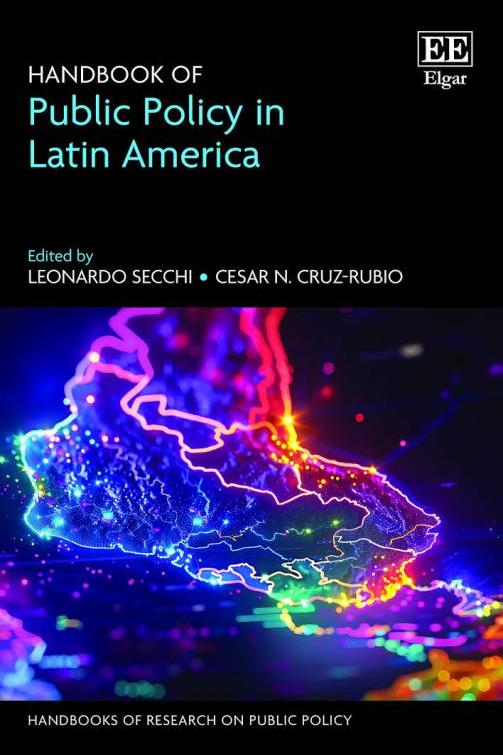Foreword by Luis F. Aguilar-Villanueva xxiii
Acknowledgments
1. Introduction to Public Policy in Latin America, Leonardo Secchi and César N. Cruz-Rubio
PART I ANALYTICAL THEORETICAL
2. Multiple streams framework in Latin America, Ana Cláudia Niedhardt Capella
3. The Institutional Analysis and Development framework: theoretical developments and empirical cases in Latin America, Raúl Pacheco-Vega and Miguel Eduardo Alva-Rivera
4. Two decades of uses and applications of the Advocacy Coalition Framework to study the policy process in Latin America: what have we learned?, Paúl Cisneros
5. The Punctuated Equilibrium Theory in Latin America, Laura Chaqués Bonafont, Felipe Gonçalves Brasil and Beatriz Policicio Rey
6. The argumentative turn in policy analysis: tracking its development in Latin America, Leonardo Secchi, Frank Fischer and Sulivan Desirée Fischer
7. Critical Policy Studies in Latin America, Rosana de Freitas Boullosa
8. Evolution of the narrative approach to public policy in Latin America: the cases of Argentina, Brazil, and Mexico (1990–2022), Alejandro Miguel Estévez and Marcela H. Cifarelli
9. Latin America and policy transfer, diffusion, and circulation, Osmany Porto de Oliveira, Cecilia Osorio Gonnet and Raúl Pacheco-Vega
10. Movement, irreversibility, and instability: elements for rethinking the functioning of government and public policy, Pedro Medellín Torres
11. The Coalitions of Future Temporalities (CFT) Framework: a route of theoretical hybridization for glocal policies, Martha Isabel Gómez Lee
12. Latin American developments in public policy theory, André-Noël Roth-Deubel
PART II CROSS COUNTRY
13. Is it rational? The rationalist approach in the design of health policies in Brazil, Colombia, and Mexico, Laura Flamand and Ana Paulina González Arroyo
14. Transparency in Latin America: Argentina, Brazil, Colombia, and Mexico, Marco Antonio Carvalho Teixeira, Robson Zuccolotto, Mario Vinícius Claussen Spinelli and Rayane Vieira Rodrigues
15. Citizen participation in the policy cycle in Latin America, Thamy Pogrebinschi and Melisa Ross
16. Subnational development, state capacities, and policy implementation: a comparative analysis of Brazil, Chile, and Colombia, José A. Hernández-Bonivento, Eduardo José Grin and Camilo Vial Cossani
17. Evaluation from and for Latin America: key elements for a culturally responsive evaluation approach proposal adapted to the regional reality, Celeste Ghiano
18. Regulation and public policy in Latin America: regional experience and contemporary challenges, Bruno Queiroz Cunha
19. Towards a design of gender-transformative care systems in Latin America: Mexico, Colombia, Costa Rica, Argentina, Chile, and Uruguay, Alejandra Benítez Silva and Tatiana Revilla-Solís
20. Teaching policy in Latin America: an overview, Fernando de Souza Coelho and Bruno Dias Magalhães
21. Communication policy in Latin America, Palmira Chavero, Werner Vásquez von Schoettler and Isabel Ramos
22. Critical theory in public policy and anti-corruption strategies in Latin America: unveiling the limitations (and hypocrisy?) of the dominant anticorruption discourse, David Arellano-Gault, Gabriel Rojas-Salazar and Luis Roberto
23. Design and implementation of open government policies and strategies in Latin America (2012–2022), Álvaro V. Ramírez-Alujas and César Nicandro Cruz-Rubio
24. Public sector innovation labs in Latin America: grasping their maturity level, Cristina Galíndez Hernández and Hironobu Sano
25. Artificial intelligence in Latin America’s public policy cycles, Juan David Gutiérrez and Sarah Muñoz-Cadena
26. Problem definition in the agenda setting process for the decriminalization of abortion in Central America, Jeraldine Alicia del Cid Castro and Gloria del Castillo Alemán
PART III COUNTRY AND CASE STUDIES
27. Public policy-making process in Argentina, Diego Pando
28. A critical analysis of public policies in Bolivia, Mauricio Alzérreca Medrano
29. Public policies in the building of independent Brazil: a historical perspective, Frederico Lustosa da Costa
30. Public policy in Chile, Bernardo Navarrete Yáñez
31. Public policy in Colombia, Juan Guillermo Vieira Silva, Santiago Leyva Botero and Pablo Sanabria-Pulido
32. Politics and public policy in Guatemala, Jeraldine Alicia del Cid Castro
33. Public policy in Mexico: tensions at the center of government, Ernesto Velasco Sánchez
34. Public policies in Peru: a historical background, Luis Solari de la Fuente and Mariano Solari Moscoso
35. Policymaking at the world’s eco-laboratory: contradictions in Costa Rican environmental policy, Alonso Ramírez Cover and Tania Rodríguez Echavarría
36. Human rights and public policies in Ecuador: between centrality and the “thorn in the side”, Efrén Ernesto Guerrero Salgado
37. Higher education policy in Venezuela: the transition from a participatory to an exclusionary model, José Rafael Mendoza Márquez
38. Public policy in the Dominican Republic in light of the National Development Strategy 2012–2030, Gregorio Montero Montero
PART IV CONCLUSIONS
39. Challenges and perspectives for public policy in Latin America, César N. Cruz-Rubio, Leonardo Secchi, Nicolás Bentancur, AndréNoël Roth-Deubel and Juan Guillermo Vieira Silva





